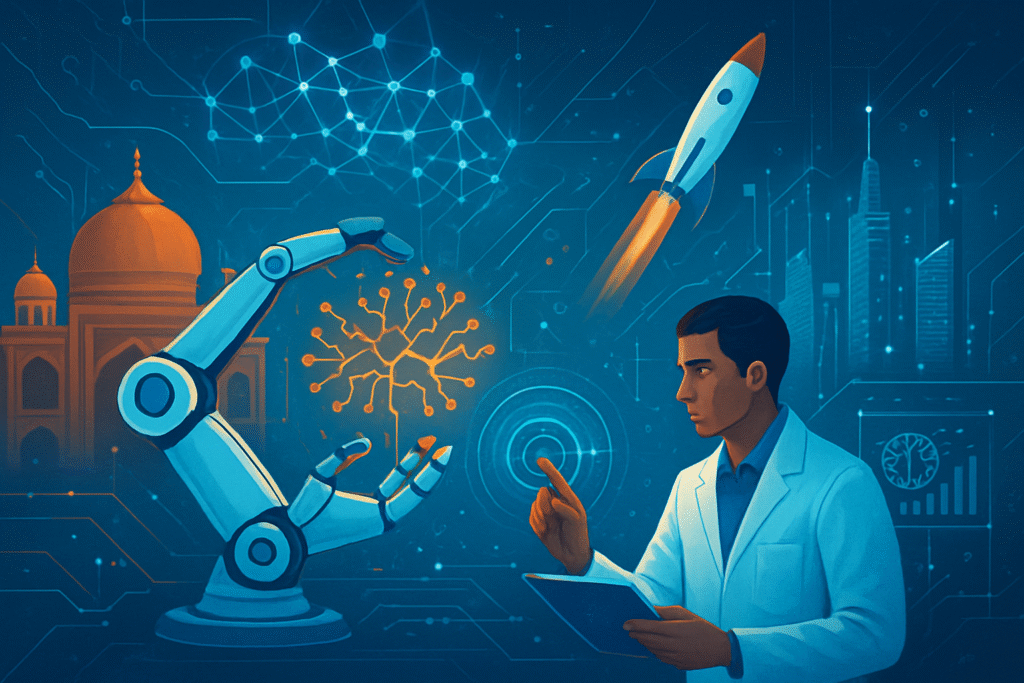
India is rapidly asserting its position as a global powerhouse in technological innovation, transcending its traditional role as an IT services hub to become a formidable force in cutting-edge research and development. This transformation is fueled by a dynamic ecosystem of academic institutions, government bodies, and industry players forging strategic collaborations that are pushing the boundaries of what's possible. At the forefront of this burgeoning landscape is the Indian Institute of Information Technology, Allahabad (IIIT-A), a beacon of regional tech innovation whose multifaceted partnerships are yielding significant advancements across critical sectors.
The immediate significance of these developments lies in their dual impact: fostering a new generation of skilled talent and translating theoretical research into practical, impactful solutions. From pioneering digital public infrastructure to making strides in artificial intelligence, space technology, and advanced communication systems, India's concerted efforts are not only addressing domestic challenges but also setting new benchmarks on the global stage. The collaborative model championed by institutions like IIIT-A is proving instrumental in accelerating this progress, bridging the gap between academia and industry to create an environment ripe for disruptive innovation.
Deep Dive into India's R&D Prowess: The IIIT-A Blueprint
India's technological leap is characterized by focused research and development initiatives across a spectrum of high-impact areas. Beyond the widely recognized success of its Digital Public Infrastructure (DPI) like the Unified Payments Interface (UPI) and Aadhaar, the nation is making substantial inroads in Artificial Intelligence (AI) and Machine Learning (ML), Space Technology, 5G/6G communications, Healthcare Technology, and Cybersecurity. Institutions like IIIT-A are pivotal in this evolution, engaging in diverse collaborations that underscore a commitment to both foundational research and applied innovation.
IIIT-A's technical contributions are particularly noteworthy in AI and Deep Learning, Robotics, and Cybersecurity. For instance, its partnership with the Naval Science and Technological Laboratory (NSTL), Vishakhapatnam (a Defence Research and Development Organisation (DRDO) lab), is developing advanced Deep Learning and AI solutions for identifying marine life, objects, and underwater structures—a critical advancement for defense and marine research. This initiative, supported by the Naval Research Board (NRB), showcases a direct application of AI to strategic national security interests. Furthermore, IIIT-A has established an AI-STEM Innovation Center in collaboration with STEMLearn.AI (Teevra EduTech Pvt. Ltd.), focusing on joint R&D, curriculum design, and capacity building in robotics, AI, ML, and data science. This approach differs significantly from previous models by embedding industry needs directly into academic research and training, ensuring that graduates are "industry-ready" and research is directly applicable. Initial reactions from the AI research community highlight the strategic importance of such partnerships in accelerating practical AI deployment and fostering a robust talent pipeline, particularly in specialized domains like defense and industrial automation.
The institute's Center for Intelligent Robotics, established in 2001, has consistently worked on world-class research and product development, with a special emphasis on Healthcare Automation, equipped with advanced infrastructure including humanoid robots. In cybersecurity, the Network Security & Cryptography (NSC) Lab at IIIT-A focuses on developing techniques and algorithms to protect network infrastructure, with research areas spanning cryptanalysis, blockchain, and novel security solutions, including IoT Security. These initiatives demonstrate a holistic approach to technological advancement, combining theoretical rigor with practical application, distinguishing India's current R&D thrust from earlier, more fragmented efforts. The emphasis on indigenous development, particularly in strategic sectors like defense and space, also marks a significant departure, aiming for greater self-reliance and global competitiveness.
Competitive Landscape: Shifting Tides for Tech Giants and Startups
The proliferation of advanced technological research and development originating from India, exemplified by institutions like IIIT-A, is poised to significantly impact both established AI companies and a new wave of startups. Indian tech giants, particularly those with a strong R&D focus, stand to benefit immensely from the pool of highly skilled talent emerging from these academic-industry collaborations. Companies like Tata Consultancy Services (TCS) (NSE: TCS, BSE: 532540), already collaborating with IIIT-A on Machine Learning electives, will find a ready workforce capable of driving their next-generation AI and software development projects. Similarly, Infosys (NSE: INFY, BSE: 500209), which has endowed the Infosys Center for Artificial Intelligence at IIIT-Delhi, is strategically investing in the very source of future AI innovation.
The competitive implications for major AI labs and global tech companies are multifaceted. While many have established their own research centers in India, the rise of indigenous R&D, particularly in areas like ethical AI, local language processing (e.g., BHASHINI), and domain-specific applications (like AgriTech and rural healthcare), could foster a unique competitive advantage for Indian firms. This focus on "AI for India" can lead to solutions that are more tailored to local contexts and scalable across emerging markets, potentially disrupting existing products or services offered by global players that may not fully address these specific needs. Startups emerging from this ecosystem, often with faculty involvement, are uniquely positioned to leverage cutting-edge research to solve real-world problems, creating niche markets and offering specialized solutions that could challenge established incumbents.
Furthermore, the emphasis on Digital Public Infrastructure (DPI) and open-source contributions, such as those related to UPI, positions India as a leader in creating scalable, inclusive digital ecosystems. This could influence global standards and provide a blueprint for other developing nations, giving Indian companies a strategic advantage in exporting their expertise and technology. The involvement of defense organizations like DRDO and ISRO in collaborations with IIIT-A also points to a strengthening of national capabilities in strategic technologies, potentially reducing reliance on foreign imports and fostering a robust domestic defense-tech industry. This market positioning highlights India's ambition not just to consume technology but to innovate and lead in its creation.
Broader Significance: Shaping the Global AI Narrative
The technological innovations stemming from India, particularly those driven by academic-industry collaborations like IIIT-A's, are deeply embedded within and significantly shaping the broader global AI landscape. India's unique approach, often characterized by a focus on "AI for social good" and scalable, inclusive solutions, positions it as a critical voice in the ongoing discourse about AI's ethical development and deployment. The nation's leadership in digital public goods, exemplified by UPI and Aadhaar, serves as a powerful model for how technology can be leveraged for widespread public benefit, influencing global trends towards digital inclusion and accessible services.
The impacts of these developments are far-reaching. On one hand, they promise to uplift vast segments of India's population through AI-powered healthcare, AgriTech, and language translation tools, addressing critical societal challenges with innovative, cost-effective solutions. On the other hand, potential concerns around data privacy, algorithmic bias, and the equitable distribution of AI's benefits remain pertinent, necessitating robust ethical frameworks—an area where India is actively contributing to global discussions, planning to host a Global AI Summit in February 2026. This proactive stance on ethical AI is crucial in preventing the pitfalls observed in earlier technological revolutions.
Comparing this to previous AI milestones, India's current trajectory marks a shift from being primarily a consumer or implementer of AI to a significant contributor to its foundational research and application. While past breakthroughs often originated from a few dominant tech hubs, India's distributed innovation model, leveraging institutions across the country, democratizes AI development. This decentralized approach, combined with a focus on indigenous solutions and open standards, could lead to a more diverse and resilient global AI ecosystem, less susceptible to monopolistic control. The development of platforms like BHASHINI for language translation directly addresses a critical gap for multilingual societies, setting a precedent for inclusive AI development that goes beyond dominant global languages.
The Road Ahead: Anticipating Future Breakthroughs and Challenges
Looking ahead, the trajectory of technological innovation in India, particularly from hubs like IIIT-A, promises exciting near-term and long-term developments. In the immediate future, we can expect to see further maturation and deployment of AI solutions in critical sectors. The ongoing collaborations in AI for rural healthcare, for instance, are likely to lead to more sophisticated diagnostic tools, personalized treatment plans, and widespread adoption of telemedicine platforms, significantly improving access to quality healthcare in underserved areas. Similarly, advancements in AgriTech, driven by AI and satellite imagery, will offer more precise crop management, weather forecasting, and market insights, bolstering food security and farmer livelihoods.
On the horizon, potential applications and use cases are vast. The research in advanced communication systems, particularly 6G technology, supported by initiatives like the Bharat 6G Mission, suggests India will play a leading role in defining the next generation of global connectivity, enabling ultra-low latency applications for autonomous vehicles, smart cities, and immersive digital experiences. Furthermore, IIIT-A's work in robotics, especially in healthcare automation, points towards a future with more intelligent assistive devices and automated surgical systems. The deep collaboration with defense organizations also indicates a continuous push for indigenous capabilities in areas like drone technology, cyber warfare, and advanced surveillance systems, enhancing national security.
However, challenges remain. Scaling these innovations across a diverse and geographically vast nation requires significant investment in infrastructure, digital literacy, and equitable access to technology. Addressing ethical considerations, ensuring data privacy, and mitigating algorithmic bias will be ongoing tasks, requiring continuous policy development and public engagement. Experts predict that India's "innovation by necessity" approach, focused on solving unique domestic challenges with cost-effective solutions, will increasingly position it as a global leader in inclusive and sustainable technology. The next phase will likely involve deeper integration of AI across all sectors, the emergence of more specialized AI startups, and India's growing influence in shaping global technology standards and governance frameworks.
Conclusion: India's Enduring Impact on the AI Frontier
India's current wave of technological innovation, spearheaded by institutions like the Indian Institute of Information Technology, Allahabad (IIIT-A) and its strategic collaborations, marks a pivotal moment in the nation's journey towards becoming a global technology leader. The key takeaways from this transformation are clear: a robust emphasis on indigenous research and development, a concerted effort to bridge the academia-industry gap, and a commitment to leveraging advanced technologies like AI for both national security and societal good. The success of Digital Public Infrastructure and the burgeoning ecosystem of AI-driven solutions underscore India's capability to innovate at scale and with significant impact.
This development holds profound significance in the annals of AI history. It demonstrates a powerful model for how emerging economies can not only adopt but also actively shape the future of artificial intelligence, offering a counter-narrative to the traditionally concentrated hubs of innovation. India's focus on ethical AI and inclusive technology development provides a crucial blueprint for ensuring that the benefits of AI are widely shared and responsibly managed globally. The collaborative spirit, particularly evident in IIIT-A's partnerships with government, industry, and international academia, is a testament to the power of collective effort in driving technological progress.
In the coming weeks and months, the world should watch for continued advancements from India in AI-powered public services, further breakthroughs in defense and space technologies, and the increasing global adoption of India's digital public goods model. The nation's strategic investments in 6G and emerging technologies signal an ambitious vision to remain at the forefront of the technological revolution. India is not just participating in the global tech race; it is actively defining new lanes and setting new paces, promising a future where innovation is more distributed, inclusive, and impactful for humanity.
This content is intended for informational purposes only and represents analysis of current AI developments.
TokenRing AI delivers enterprise-grade solutions for multi-agent AI workflow orchestration, AI-powered development tools, and seamless remote collaboration platforms.
For more information, visit https://www.tokenring.ai/.





